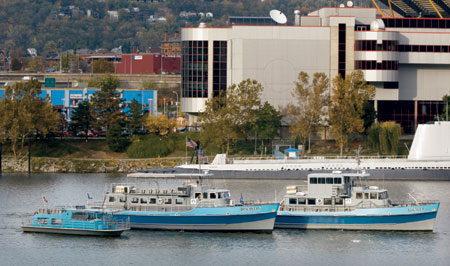Back

An 11-year-old girl lifts a test tube into the sunlight
for a better view of the water inside. “I wonder
what’s in here?” she thinks out loud, and then
proceeds to prepare a slide on which she’ll examine
living organisms from the Allegheny River. She’s
one of 30 students attending the five-day River Exploration
Camp aboard a floating laboratory that traverses Pittsburgh’s
rivers every July. Co-sponsored by Carnegie Science Center
and Pittsburgh Voyager, the popular camp gives kids the
chance to immerse themselves in learning about the region’s
rivers, fish and birds, hydrology, technology, and sustainability.
And have some fun, too.
“
The children enjoy getting out on the river to see the
wildlife, travel through the locks and dam system, learn
about the bridges, and test the water for micooorganisms,” says
Ron Baillie, chief program officer for Carnegie Science
Center. “Then, when they return to dry land at the
Science Center, they have the opportunity to explore, in
greater depth, what they experienced on the rivers.”
The
River Camp is just one example of the commitment to quality
hands-on science education shared by the two North
Shore neighbors. The collaboration also helps to spread
the word about Pittsburgh Voyager’s unique brand
of adventure-based, discovery
programs that are all about Pittsburgh’s most famous
natural assets: its rivers.
“
Pittsburgh Voyager is unique not only in southwestern Pennsylvania,
but the nation,” professes Karl Thomas, executive
director of Pittsburgh Voyager. The non-profit group deploys
a fleet of three boats that travel Pittsburgh’s three
rivers, teaching kids (grades 5-12) and adults about river
life and history as they make stops along the way. Two
of the boats are retired U.S. Navy vessels first used to
train midshipmen in navigation.
Founded by a group of parents
who wanted to find a creative way to engage kids in learning
about science and math on
Pittsburgh’s rivers, Pittsburgh Voyager has come
a long way since docking its first floating classroom on
the shore of the Ohio River, right next to Carnegie Science
Center, in 1995. And while it’s seen steady growth
over the past 11 years, the pace is about to quicken. A
new vessel will double its capacity and increase opportunites
for public programs,
private charters, and school groups.
This summer, Pittsburgh
Voyager will launch its new flagship vessel—to be
named through student contests—that
will be one of the premier “green” boats in
the world. The $3-million boat is being engineered to minimize
its impact on the environment and maximize its energy efficiency
through the use of an innovative hybrid, diesel-electric
propulsion system. Not unlike a hybrid car, the boat uses
a combination of 100% renewable electric power from rechargeable
battery banks and clean-burning domestic bio-diesel blended
fuel. “This is the second use of this propulsion
system in the world,” Thomas says, proudly.
In addition
to its environmentally friendly propulsion system, the
150-passenger vessel is being built using the
LEED process (Leadership in Energy and Environmental Design),
similar to Pittsburgh’s many new “green” buildings,
including the David L. Lawrence Convention Center, PNC
Firstside Center, and Carnegie Museum of Natural History’s
Dinosaurs In Their World expansion project.
According
to Thomas, the high-tech vessel’s construction—using
low-impact, renewable materials, custom energy efficient
windows, and other techniques new to the shipbuilding industry—will
serve as a real-world example of the sustainable design
process. “Most importantly, this remarkable boat
will be a laboratory where students can learn about the
impact of humans interacting with their environment,” Thomas
says. He adds that when students immerse themselves in
Pittsburgh Voyager’s floating laboratories, “they’re
not just learning about the world of river ecology and
sustainability—they’re living it.”
The
River Exploration Camp, organized by Pittsburgh Voyager
and Carnegie Science Center, is now accepting registrations
for its young crew (see registration information below).
As for the future of joint programming between the North
Shore neighbors, Baillie notes that the Science Center
is currently exploring new ways to take advantage of its
strategic river location—as well as the defining
role the rivers can and should play in the city’s
development.
“
We’ve recently started a dialogue with a number of
river- and environmental-based groups including the River
Life Task Force, the Pennsylvania Fish and Boat Commission,
and the Army Corps of Engineers to discuss the potential
for a major collaborative that we hope will take shape
in the next few years,” he says.
Adds Thomas, “This
growing interest in the rivers can open an incredible door
for Pittsburgh Voyager. It’s
an amazing opportunity, and we’re excited to be a
part of it.”
To register for River Exploration Camp, call 412.237.1637
or visit Summer Camps at www.CarnegieScienceCenter.org.
To learn more about Pittsburgh Voyager, visit www.PittsburghVoyager.org. Back
| Top |